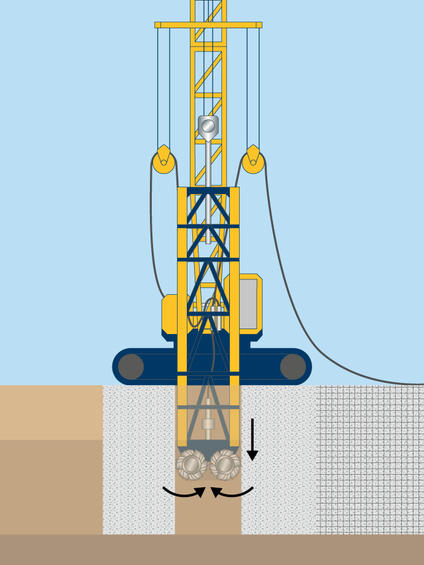Diaphragm walls are very rigid walls that offer significant resistance to bending from lateral loads and are water-resistant.

Common uses
Process
Since reinforced walls are designed and constructed as a series of panels, their overall length has no practical limit. Individual panels usually range in sizes between 15 to 30 feet in length, with standard widths ranging between 24, 30, 36, and 48 inches. The depths of the wall have exceeded 200 feet regularly. Depending on the purpose of the wall, possible shapes of walls include right angles, polygonal, T-shaped, and cross-shaped walls.
Specialist contacts
Jeff Bean | Vice President Major Projects | 945-732-4188
Paul Schmall | Vice President | 973-400-3631
This equipment is suitable for soft, medium dense to dense soil & boulders (in combination with chisels) to suggested depths of up to 120ft (37m).
This equipment is suitable for hard soil and stiff clays to suggested depths of up to 260ft (80m).
This equipment is suitable for nearly all soils and rock types. Hydromills can use different cutting wheels depending on the soil and rock conditions. Achieving large depths is possible (>500ft (150m)) while maintaining very accurate verticality (<.3%), which is essential for proper closure at depths of hundreds of feet.
Applying the hydromill technique for the construction of large projects with deep slurry walls and cut-off walls offers the following advantages over the conventional clamshell techniques: economy, output, reliability, and environmental compatibility.
The hydromill continuously removes soil from the bottom of the trench, breaks it up, and mixes it with the bentonite slurry in the trench. The slurry, heavy with soil particles, is pumped through pipes to the desanding plant, where it is cleaned and returned to the trench.
Advantages
Quality assurance
Keller has a fleet of specialist wall excavation and construction equipment to complete all types of diaphragm walls.